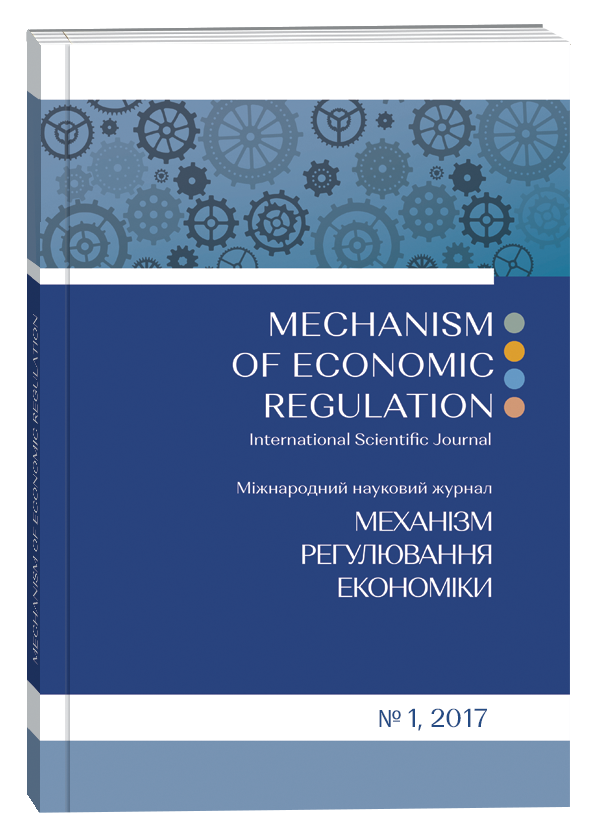SOCIO-CULTURAL DIALECTICS OF ECONOMIC SYSTEMS
Abstract
The socio-cultural principles of the functioning of economic systems, which activate the contours of intensifying and countervailing reverse relationships in the paternal triads of socio-economic reproduction in the bipolar space of sensuous and ideation culture mentalities are considered. The following methods are used: a dialectical one, an ontological one and the method of system analysis. A bifurcation mechanism in paternal practices of economics is explained by the innovative and paternal design of Schumpeter innovators that act as an organizational α-pattern of basic paternal triads of socio- economic reproduction at the microeconomic level. The homeostasis of economic systems is achieved by means of entropy: at the microeconomic level – by the replacement of α-pattern with γ-pattern as an organizational one; at the macroeconomic level – by the implementation of a chiliastic project of a “post- human” in the conditions of a sixth technological structure of NVIS-techno-convergence, which is the quintessence of the spread of the values of the sensuous culture and mechanistic worldview. At the macroeconomic level a bifurcation mechanism of the functioning of economic systems is explained by socio-cultural fluctuations of the change of a dominant type of cultural mentality. The third wave of a sixth NVIS-technological structure spreads as an innovative and paradigm project of an ideation type of culture. The cognitive space of intellectual benefits production the consumer and exchange value of which is their ontological novelty, which reflects the degree of relevance of noumenal and phenomenal existence acts as the attractiveness environment of forming the noo-economy of ideation culture. The scientific novelty of the research lies in: firstly, the definition of an entropy mechanism of pattern substitution in the structure of business triads; secondly, the definition of the space of socio-cultural fluctuations as a prerequisite for the essential changes of the functioning of economic systems; thirdly, the hypothesis development that the noo-economy of ideation culture arises as a result of the modifications of a cognitive cover of a paternal core and is accompanied by the emergence of such a variant of catallaxy where the source of the information product value is the essence dimension of being narratives given through noumenon-concept and expressed by a sign-image-mediator in the structure of a word-symbol of the ideation culture. The practical significance of the theoretical results lies in the fact that the consideration of socio-cultural characteristics of fluctuations in economic development processes minimizes those externalities that reproduce the vicious circles of economic extractions, increasing economic contradictions.
References
Арендт, Г. Становище людини / Г. Арендт ; пер. з англ. – Львів : Літопис, 1999. – 250 с.
Бауман, З. Глобалізація. Наслідки для людини і суспільства / З. Бауман ; пер. з англ. І. Андрущенка ; за наук. ред. М. Винницького. – К. : Вид. дім «Києво-Могилянська академія», 2008. – 109 с.
Бердяев, Н. А. Смысл творчества: Опыт оправдания человека / Н. А. Бердяев. – М. : Издательство АСТ ; Харьков : Фолио, 2004. – 678 с.
Блауг, М. Економічна теорія в ретроспективі / М. Блауг. – К. : Основи, 2001. – 680 с.
Бодріяр, Ж. Символічний обмін і смерть / Ж. Бодріяр. – Львів : Кальварія, 2004. – 376 с.
Булгаков, С. Розмисли. Творча спадщина у контексті ХХІ століття / С. Булгаков ; за ред. В. Д. Базилевича. – К. : Знання, 2006. – 903 с. – (Славетні постаті).
Булгаков, С. Н. Два града: исследование о природе общественных идеалов / С. Н. Булгаков. – М. : Астрель, 2008. – 784 с.
Гайдеггер, М. Дорогою до мови / М. Гайдеггер. – Львів : Літопис, 2007. – 232 с.
Генон, Р. Царство количества и знамения времени / Р. Генон ; пер. с фр. Любимовой Т. Б. – М. : Беловодье, 2011. – 304 с.
Гумилев, Л. Н. Этногенез и биосфера Земли / Л. Н. Гумилев. – М. : Издательство АСТ, 2001. – 560 с.
Кантор, К. Двойная спираль истории: Историософия проектизма. Т.1: Общие проблемы / К. Кантор. – М. : Языки славянской культуры, 2002. – 904 с.
Кастельс, М. Інтернет-галактика. Міркування щодо інтернету, бізнесу і суспільства / М. Кастельс. – К. : Видавництво «Ваклер» у формі ТОВ, 2007. – 304 с.
Кизим, М. О. Перспективи розвитку і комерціалізації нанотехнологій в економіках країн світу та України : монографія / М. О. Кизим, І. Ю. Матюшенко. – Х. : ІНЖЕК, 2011. – 392 с.
Левицкий, С. А. Трагедия свободы: избранные произведения / С. А. Левицкий. – М. : Астрель, 2008. – 992 с.
Мельник, Л. Г. Фундаментальные основы развития / Л. Г. Мельник. – Сумы : Университетская книга, 2003. – 288 с.
Мизес, Л. Человеческая деятельность: трактат по экономической теории / Л. Мизес ; 2-е испр. изд. – Челябинск : Социум, 2005. – 878 с.
Морис, Я. Чому Захід панує – натепер / Оповіді з історії та що з них випливає щодо майбутнього / Я. Морис. – К. : КЛІО, 2014. – 784 с.


